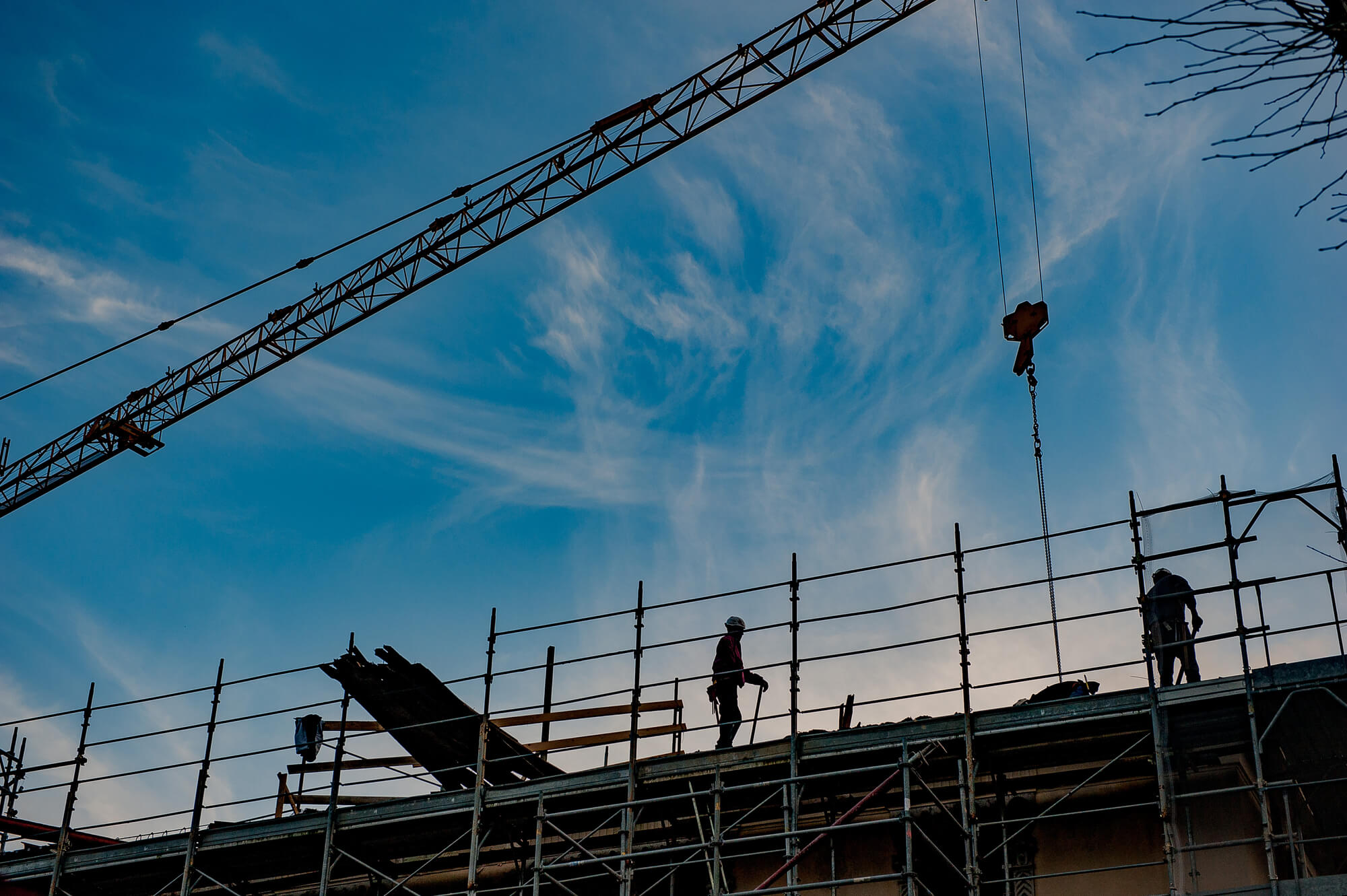The ongoing war in Ukraine has exacerbated the global climate crisis bringing the urgent need for sustainable and resilient infrastructure in to sharp focus. The widespread destruction has underscored the importance of rebuilding not just quickly, but responsibly, with an eye toward reducing carbon emissions. As Ukraine continues with its accession negotiations for EU membership, European initiatives related to sustainable building can support Ukraine in facing its reconstruction needs.
The recent New European Bauhaus (NEB) initiative attempts to resolve the sustainability issues related to buildings, while also improving community cohesion, inclusion, and the overall aesthetic of the built environment. Despite having only started in 2021, the NEB is gaining momentum in Europe and the changes it is driving are becoming more and more visible with prizes and festivals celebrating achievements by the community. It’s emphasis on co-creation, connecting arts, sciences, culture, and people, and its formation as a ground-up initiative has resonated with many, and best practice examples and demonstrations are popping up all over Europe.
Yet a gap remains. While these exemplary cases highlight the potential outcomes of the NEB approach, widespread adoption of the NEB values and working principles seems far off. To continue growing, training on the NEB and modern design, materials, and systems is needed across the construction ecosystem. This expansive upskilling and reskilling of workers in fields ranging from construction workers and managers to architects, engineers, insurers, financials, real estate developers, local authorities, municipal workers, and the public who will be the primary users of construction and renovation projects.
The NEB has already begun formulating an NEB Academy to help address this skills challenge that has left 78% of all SMEs in Europe struggling to find appropriately skilled employees. Several NEB Academy Hubs have been established in the EU, and work is currently underway to organise the hubs and build up both a business model and service for the NEB Academy.
The NEB is built on three values, sustainability, inclusivity, and aesthetics, which set the core direction for the development of the initiative. During the co-creation events in 2021 that defined the NEB as what it is today, three working principles emerged that would ensure these values were core aspects of any project seeking to implement them. These principles are participatory action, multi-level engagement, and transdisciplinary approaches.
Values:
- Sustainability: the NEB focuses on the environmental impact of sustainability, seeking to reduce the harm done from resource extraction and processing, eliminate waste, and improve energy efficiency. A core theme is to reconnect with nature, and work towards regeneration of natural spaces while integrating nature in our built environment.
- Inclusivity: NEB prioritises equality for all and equal access as a baseline throughout all phases of the project. This relates to accessibility, affordability, and fairness.
- Aesthetics: The NEB considers beauty to include value beyond function – what more does a built object provide that its main function? The goal is to inspire, create a sense of community through cultural understanding, and elevate our living, working, and recreation places.
Principles:
- Participatory: Building and infrastructure projects should include all who may be affected by them from the idea generation phase, through planning, construction, use and maintenance, and deconstruction. Participatory processes help improve inclusivity, and broaden aesthetic perspectives, as well as bring broad knowledge and ideas about sustainability.
- Multi-level: The multi-level approach focuses on building many local success – addressing problems where solutions are most needed – to create regional, national, and global change.
- Transdisciplinary: A participatory process with perspectives and expertise from many fields (and not only those directly related to construction) allows us to break down barriers to access and creativity, shake-up normal ways of working, and to address complex problems with novel approaches.
Where are we today?
The NEB Academy is an educational initiative addressing upskilling and reskilling in the construction ecosystem by focusing on a systemic approach to sustainable construction through the NEB’s core values and working principles. In an ongoing study in Europe and Ukraine being conducted by the InnoRenew CoE, knowledge gaps in this area have been identified related to bio-based building materials, digital technologies, and increased circularity, as well as issues related to culture, art, inclusivity, fair access to quality-built environments, and co-creation. These knowledge gaps are amongst the many to be addressed in Europe, where 3 million workers in the construction sector are expected to be upskilled or reskilled in the next 5 years. In Ukraine’s case, the urgent need for new construction and constant threat of further destruction from the war can easily shift the conversation away from sustainability and beauty. Nonetheless, as the climate crisis continues – and is amplified by the effects of the war – new ways to design and build our built environment are needed, which means upskilling and reskilling of actors throughout the construction ecosystem is needed in Ukraine, too.
Successful models of NEB Academy Hubs, such as the New European Bauhaus Academy Pioneer Hub for Sustainable Built Environments with Renewable Materials (NEBAP Hub) that was established at the University of Primorska in Slovenia are making their mark on the design of the built environment. The NEBAP Hub offers trainings for the construction ecosystem on the use of bio-based materials, digital technologies, and increased circularity to accelerate decarbonization of the built environment in Europe and beyond. While providing training, it is working towards other systemic changes, too, like implementing micro-credentials as a certification methodology for life-long learning and short-term learning experiences that can drive interest and trust in reskilling and upskilling efforts. Changing the construction ecosystem will require both training and other systemic changes.
Following a request from the Ukrainian government in 2024, U-LEAD with Europe and InnoRenew CoE began collaborating with experts and construction ecosystem stakeholders to develop transform building practices in Ukraine. The “Rebuilding a better Ukraine via the New European Bauhaus Academy” initiative that followed as been working towards establishing an NEB Academy Hub in Ukraine. Through this Hub the type of broad, cross-disciplinary training that is needed across the construction ecosystem can be spread and supported by other NEB Academy Hubs as well.
The NEB Academy Hub Ukraine initiative has been active in collecting information from surveys, case-studies, focus groups, interviews, from within the construction sector actors and training providers in Ukraine. Distilling this information to find core training needs, the InnoRenew CoE has already begun training the future trainers of an NEB Academy Hub in Ukraine on NEB values and principles, the NEB Compass for assessing NEB projects, co-creation, and construction techniques focused on bio-based materials, cultural heritage renovation, and building performance.
Where are we going?
With the goal to get a NEB Academy Hub up-and-running in early 2025, the NEB Academy Hub Ukraine initiative is actively exploring all routes towards establishing a Hub in Ukraine that serves the needs of a broad spectrum of knowledge seekers. As the project moves forwards, more training will be provided for actors at multiple levels of society – from policy makers to construction professionals and local authorities.
While considering the form and operations of the NEB Academy Hub in Ukraine, training topics are being considered as well. An ongoing survey for construction ecosystem members in Ukraine is helping to identify these areas. Broadly speaking, many changes are needed to transform our current approach to construction and renovation. The New European Bauhaus and the NEB Academy can be a key driver in the transformation by helping spread knowledge about key aspects, including:
- Commitment to sustainability: All stakeholders within the construction ecosystem must be aware of and dedicated to sustainable practices that are economically viable, fair, and just.
- Use of sustainable materials: Prioritizing the use of sustainable and renewable materials is essential. This ensures that buildings not only reduce their environmental impact but also support the broader goals of sustainability.
- Energy efficiency and smart technologies: Buildings must be energy efficient, incorporating the latest smart technologies to optimize performance and reduce energy consumption.
- User-centric design: Future buildings should be designed with the needs of their users in mind, promoting human health and well-being. This involves selecting materials that enhance comfort and safety, ensuring adequate natural light, good air quality, appropriate acoustics, and encouraging physical activity.
- Community engagement: Promoting interaction and engagement within communities is vital. Buildings should be designed to foster a sense of community and connection among their occupants.
- Resilience to climate change: The changing climate and environmental conditions must be reflected in building design. This means considering extreme weather events and constructing resilient buildings that can withstand such challenges.
- Safety as a priority: Ensuring the safety of building occupants is paramount. Buildings must adhere to rigorous safety standards, addressing common concerns such as fire safety, structural integrity, and indoor air quality. Additionally, designs should incorporate features that enhance security and protect occupants during emergencies.
- Renovation of existing buildings: These principles should also guide the renovation of existing buildings, ensuring that they meet modern standards for sustainability, efficiency, and resilience.
The NEB Academy Hub in Ukraine initiative will provide new trainers with training materials addressing areas such as these to ease the transition into providing new training by new methods.
Sustainable, beautiful, inclusive & resilient projects in Ukraine.
Ukraine has already established itself as a leading actor in NEB projects, having won an NEB prize for prioritising the people and places that need the most support and two awarded projects in the “Special Recognition to Ukraine’s Reconstruction and Recovery Effort” category. These projects highlight the ways Ukraine is already engaging with NEB activities and show that it is ready and capable to do more in this area. With an NEB Academy Hub in Ukraine, these successes can easily multiply and spread across the country. The most important outcome of these successes are the impacts the projects have on people’s lives – through providing new and renovated buildings that serve immediate needs while also thinking of environmental and social impacts, by reconnecting people with Ukraine’s abundant nature, or by creating a sense of belonging through co-creation, art, and recognitional of local culture in construction projects.
Strong interest has been shown in Ukraine already and engagement with the NEB and the NEB Academy Hub Ukraine initiative will ensure the work produces a tangible and transformative effect on not only on the built environment in Ukraine, but on society as well.
Ukraine’s need for massive reconstruction efforts presents an opportunity to show the world how to approach construction – even in a setting of recovery from war – while considering aspects of the built environment like sustainability, beauty, and inclusiveness. Ukraine can do this through multi-level engagement with local, regional, and global collaborators, transdisciplinary approaches that link arts, science, community, culture and construction together, and by ensuring a participatory process by involving local actors in decision making and empowering them to co-design solutions that meet their needs. With Ukraine’s demonstrated success so far, it has already embarked on the pathway to become a role model in implementing NEB values and principles. A NEB Academy Hub in Ukraine will accelerate this process, giving more people the knowledge and tools necessary to transform building processes in Ukraine and abroad.
This article was written by Michael Burnard and Andreja Kutnar of the InnoRenew CoE and Mariana Semenyshyn and Yaryna Stepanyuk of the U-LEAD with Europe Programme.
The ‘Rebuilding a Better Ukraine via the New European Bauhaus Academy’ (NEB Academy Hub Ukraine) initiative is implemented by the InnoRenew CoE and supported by the U-LEAD with Europe Programme.
InnoRenew CoE has been at the forefront of New European Bauhaus activities since its inception and has participated heavily in its development. It has been a key member of the Wood4Bauhaus alliance which has raised awareness about the benefits and availability of wood-based solutions for sustainable, beautiful, and inclusive buildings. It was a major contributor to the Horizon Europe – New European Bauhaus Nexus Report and now hosts the first pioneer hub of the New European Bauhaus Academy, the NEBA Pioneer (NEBAP) Hub of the University of Primorska.
U-LEAD with Europe: Local Empowerment, Accountability and Development Programme is a multi-donor action of the EU and its member states Germany, Poland, Denmark and Slovenia to support Ukraine on its path to strengthening local self-government. U-LEAD promotes transparent, accountable, resilient and responsive multi-level governance in Ukraine and empowers municipalities.
Photo: depositphotos.com/ua
Attention
The authors do not work for, consult to, own shares in or receive funding from any company or organization that would benefit from this article, and have no relevant affiliations






